Doctors from Mexico help meet the needs of some patients in the Central Valley
During a visit to her baby’s pediatrician, Sofia Lira listened intently as Dr. Rodrigo De La Cruz explained in detail –and in her language– what he observed about the baby.
“She’s gaining two ounces a day, she’s not vomiting, her skin is soft,” De La Cruz was telling Lira and her husband about the baby who was growing very well.
“As long as she keeps eating well and is comfortable, she’s going to push. We can help with the little gas, but don’t worry,” De La Cruz said, adding that he would give her a prescription to the pharmacy for a probiotic to give her five drops a day to calm the baby’s “little pain and restlessness.”
Lira, who lives in Visalia, had taken one-month-old Lizea Maria Medina to the Altura Centers for Health clinic in west Tulare on Sept. 7 because she noticed that her little girl had a swollen tummy, was constipated, and was having trouble defecating.
“I like the way he has looked at the child since she was born and always gives us his opinion, he is honest and I trust him. Very good doctor,” said Lira about De La Cruz.
De La Cruz is one of 30 doctors in a unique pilot program that brings Mexican doctors to work in Federally Qualified Health Centers in California.
Pilot program
Mexico’s Licensed Physician Pilot Program was approved in 2002.
Arnoldo Torres has worked for more than two decades overcoming many obstacles to get the program up and running. He is a political consultant, journalist, and civil rights activist.
The problem is not only the lack of doctors in the Central Valley but also the lack of cultural and linguistic proficiency, Torres said.
One of the goals of the pilot program is to help the state alleviate the shortage of Spanish-speaking, culturally responsive primary care physicians, particularly in agricultural areas like the Central Valley with a large immigrant population.
“And that’s a huge, huge challenge,” Torres said of what they faced when they began in 2017 to recruit doctors in Mexico for the pilot program in collaboration with the National Autonomous University of Mexico.
Lira said she likes that her baby’s pediatrician speaks not only English but also Spanish since it is her first language –even though she was born in the United States–, and of her husband, who was born in Mexico. “It’s good because he knows both languages.”
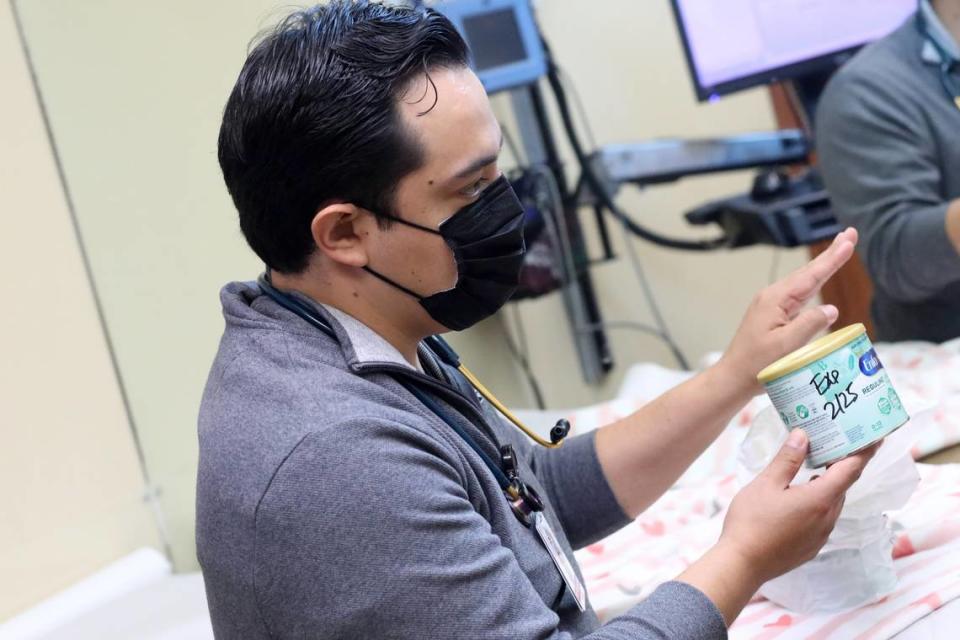
“That’s what we were hoping to create. So, you know, we’ve created it. We want to make it better. We want to expand it because we know the need is greater,” Torres said of knowing that patients like Lira and her baby feel comfortable and in trust with pilot program doctors like Dr. De La Cruz.
“And that’s what we plan to do in the next two years with the new bill we’re going to introduce.”
Torres said they are already preparing the new version of the pilot program that is going to do five cycles of three years each.
“So we’re going to do it for 15 more years,” Torres said. “We don’t want to depend on doctors from Mexico. We made an agreement with Mexico that we would not keep the doctors here permanently.”
UC Davis is evaluating the impact of the pilot program in the service areas.
Mexican doctors
Torres said the first pilot program bill was written in 2000 and it was not until mid-2021 when the first Mexican doctor under the program came to California to San Benito County to practice medicine.
“Our priority was to make sure that these doctors from Mexico were as good as any doctor in providing medical care, protocols, standards, and quality. But now they have two things that our doctors don’t. They speak the language and they know the culture,” Torres said.
Under the Mexican Licensed Physician Pilot Program, the Medical Board of California will allow up to 30 licensed physicians specializing in family practice, internal medicine, pediatrics, and obstetrics and gynecology to practice medicine in California for a period not to exceed three years. The three-year license to practice under the pilot program is not renewable.
Torres said that “the most recent data said we needed 378 primary care physicians by 2028 in California.”
Currently, the pilot program has 30 Mexican doctors –12 are women– working in clinics in Monterey, San Benito, Tulare, and Los Angeles counties.
Six of them, including Dr. De La Cruz, are working at the Altura Centers for Health clinic in Tulare County.
A long process
For the doctors, the process of getting into the program, working, and caring for the Spanish-speaking community has been a long one.
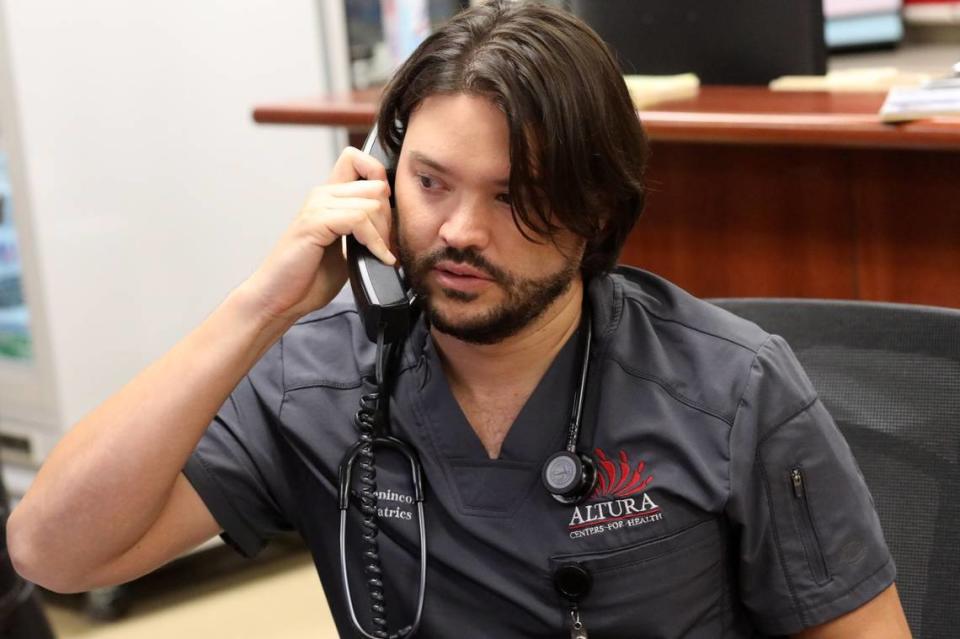
Dr. Andres Benincore was finishing his last year of pediatrics when a teacher at the university introduced him to the project and he had an interview in 2016 with Dr. Jorge Ruiz Rivera, Altura’s medical director, and Graciela Soto, executive director of the Altura clinic.
“The whole process of getting the licenses and visas took four or five years. So it was quite a long process. Everyone had a long, different process, but yes, it was more or less the same,” said Benincore.
The doctors have gone through various processes and procedures, including training courses to see the whole epidemiological context of the area.
“I think, if you put the best of Mexico, with the best of the United States, we are on par,” Benincore said. “Patients want to come with us and not only Mexican patients that only [speak] Spanish we have, we all have American patients that want to come with us because they like how we take care of them because they like how, how we listen to them ... the results they see with the treatments we give.”
Pediatrician Jorge Rocha is a specialist in pediatric emergencies, trained in Mexico at the National Autonomous University of Mexico, and works at the Altura Sur clinic.
Rocha was the first doctor in the pilot program to arrive at Altura.
“It has been very enriching, but it has taken time,” said Rocha, who is originally from Culiacán, Sinaloa, Mexico. “It’s a life experience and I took it that way. I learned a lot of things, it was super challenging, but I liked it a lot. I continue to learn every day. So it’s very cool.”
Rocha says that at the clinic he sees first contact outpatients for people who come for wellness visits such as physicals and also for short visits due to illness, whether for respiratory tract infections, gastrointestinal infections, allergic problems that are very common in the area, such as allergic rhinitis, asthma, eczema in small babies.
For Dr. Faustino Raul Resendiz Rios, gynecologist and obstetrician, practicing at the clinic in Tulare is “as if we were in our own country. The community, which at least I serve, is the same community I served in Mexico City.”
“The difference is that here we have all the resources that unfortunately in our country we don’t have to provide complete quality care to our patients,” said Resendiz Rios since many of his pregnant patients here in the Central Valley suffer from obesity, diabetes, and hypertension and altered menstrual cycles just like many of his former patients in Mexico.
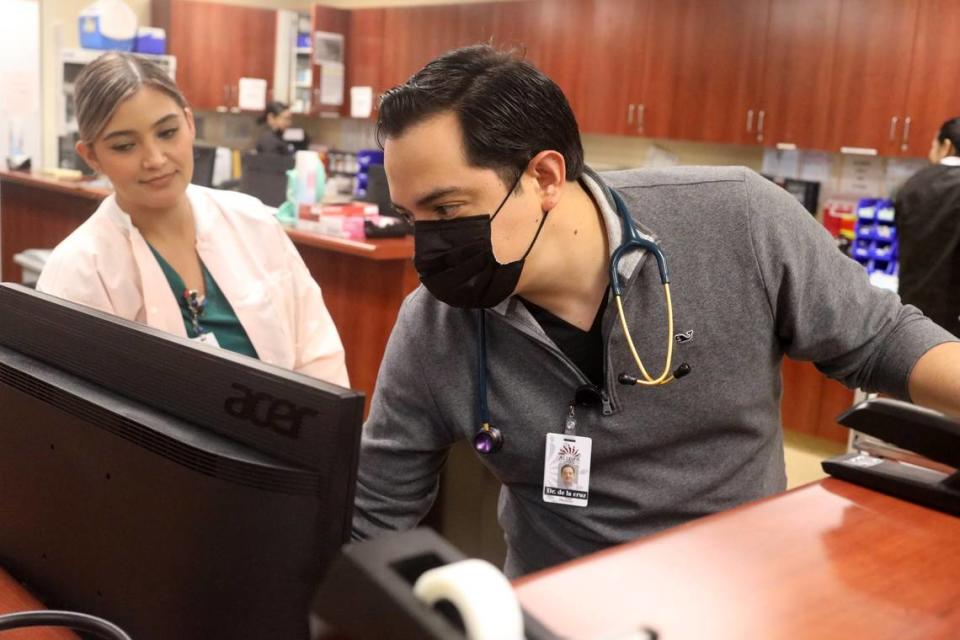
Beyond the medical practice, De La Cruz said he is happy to practice in Tulare because the connection he has created with his patients is very gratifying. Several have even recommended to him where to buy ingredients that he misses or like a lady who brought them Guadalajara-style lunches and made him feel it when he was studying in medical school.
“So that feeling of the people who left many things there, but brought it here or in a certain way continue to live it, they transmit it to you and that is very, very nice because of the noble population,” said De La Cruz.
Cultural proficiency
“In all the studies I’ve seen and I’ve read hundreds of them now. When you have the patient’s trust, the patient will tell you things they would never tell someone they don’t trust,” Torres said. “And that word confianza in Spanish is very different than in English. It’s a special word.”
Rosa Enriquez and her husband, David Garcia, like Lira, trusted Dr. De La Cruz and the way he communicated with them in the office.
For Enriquez and Garcia, who live in Corcoran, it was the first time they had brought their three-year-old son, Zion Garcia, to De La Cruz, as they had previously taken him to another clinic where they had a bad experience. The appointment that day was Zion’s physical checkup.
An acquaintance recommended the clinic where Dr. De La Cruz works and then she began to bring other of her children, one of whom suffered from asthma.
Enriquez’s husband is from Tulare County, but she was born in Guadalajara, Jalisco, Mexico, and has most of her life in the Valley when her parents brought her here.
“I speak both Spanish and English, and I can converse well with him,” Enriquez said of being able to have conversations with her son’s pediatrician in both languages.
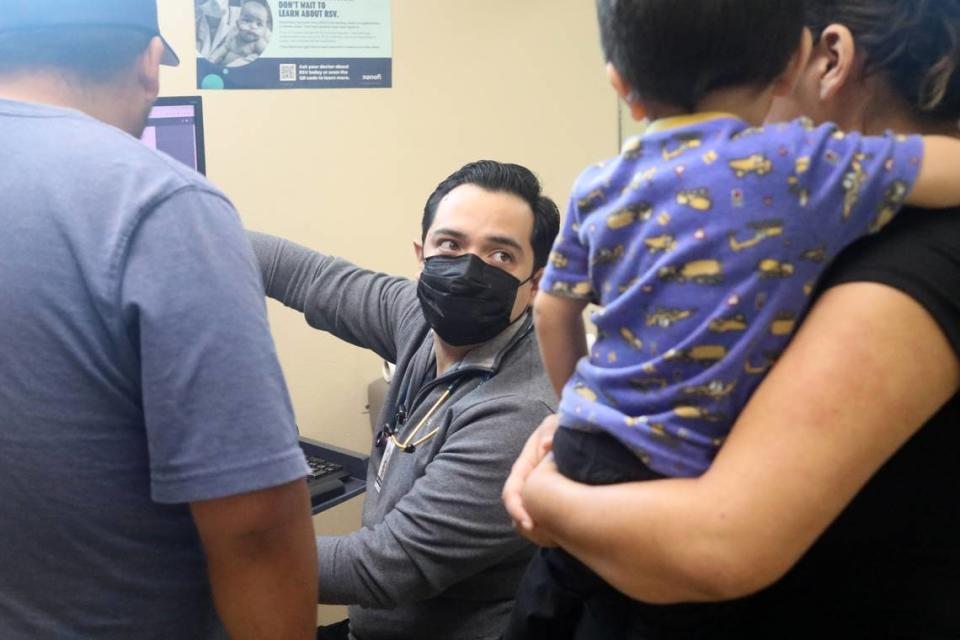
“Here you can speak with confidence,” said Enriquez, adding that she can be “yourself. Sometimes as a Mexican, there are not many words that we know well in English and they understand us that way, and there in other clinics they don’t.”
As a pediatrician, Rocha said the language issue is very interesting because for him it is important to be able to talk to the parents of his patients in their native language, which is Spanish, since for many parents it is the only language they speak, and at the same time to be able to communicate with the children in English since many of the children do not understand much Spanish.
“So it is very important to also be able to explain to the parents in a language they understand what is going on with their children,” Rocha said.
Gonzalo Puente, a family medicine doctor, said there is not only a need in the area because of the language barrier but also because of the cultural difference –the customs and the traditions that bring them closer to the patients and their families.
“I think we are definitely playing an important and super necessary role,” Puente said.
As a gynecologist, Resendiz Rios said his patients feel more comfortable with them.
“You can express and be understood completely, to having someone translating for you that sometimes they don’t translate exactly what the patient is feeling or wants to express,” Resendiz Rios said. “It’s more empathetic to the community.”
Enriquez, who is also pregnant, is a patient of gynecologist Jacobo Labastida who is also part of the Altura pilot program. Enriquez said she likes to talk to her gynecologist in her language.
“And that empathy I think is the main basis of the doctor-patient relationship,” De La Cruz said.
“As Dr. De La Cruz says, once you create a bond with the patient and the trust is reciprocal, it goes both ways,” Benincore said.
As head of the physicians at the clinic, Ruiz Rivera said he has had the opportunity to work directly with all the doctors in the program and see how they take care of the patients, and how the patients have received them.
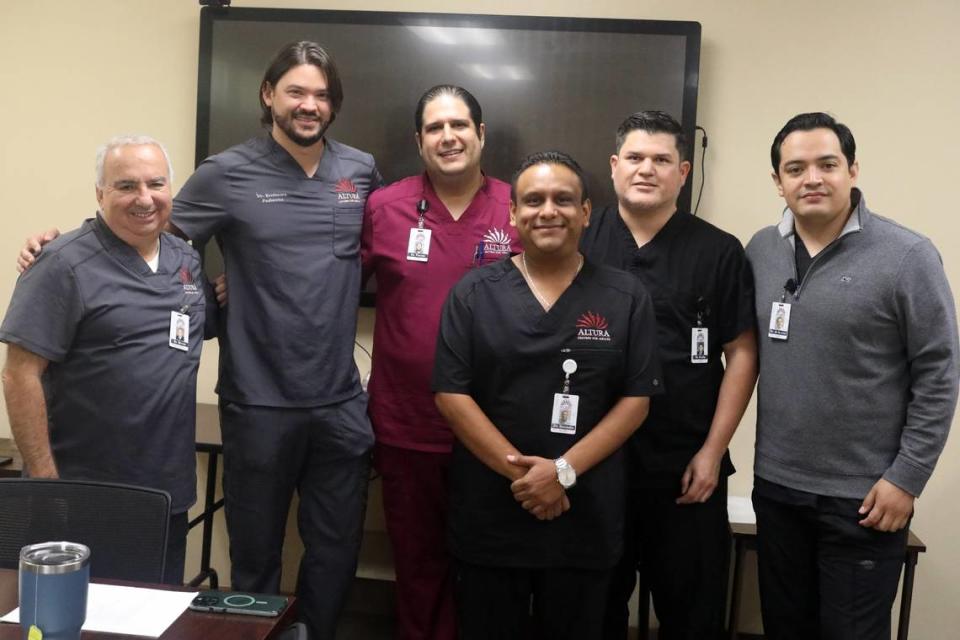
“So you can say that to participate in this program you have to be the best of the best in Mexico. And definitely, first hand I can say that we have brought excellent doctors,” said Ruiz Rivera. “They are super, super trained, they are very good doctors. It has been a blessing for us.”
Médicos de México ayudan a cubrir la necesidad de algunos pacientes en el Valle Central
This Caruthers High salutatorian and Gates Scholar has plans to go into medicine

